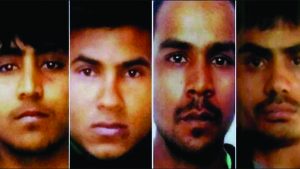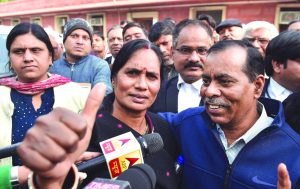 Chief Justice of India Sharad Arvind Bobde had said justice can never be instant and loses its character when it becomes revenge. Now after exhausting almost all legal remedies in the seven-year old trial in the December 2012 gruesome Delhi gang rape and murder case, the case gets a closure with execution fixed for January 22.
Chief Justice of India Sharad Arvind Bobde had said justice can never be instant and loses its character when it becomes revenge. Now after exhausting almost all legal remedies in the seven-year old trial in the December 2012 gruesome Delhi gang rape and murder case, the case gets a closure with execution fixed for January 22.
Ending the 7-year wait for justice, a Delhi court has issued death warrants against all the four convicts in the 2012 Nirbhaya rape and murder case. Akshay Thakur Singh, Mukesh, Pawan Gupta and Vinay Sharma, who were found guilty in the rape and murder of a Delhi medical student, will be hanged at 7 am on January 22.
During the hearing, the prosecution said that there was no application pending before any court or the President right now by any of the convicts and the Supreme Court dismissed the review petitions of all the convicts as well.
Now days before a court issued the death warrants against all four convicts in 2012 Delhi gang-rape case, one of the convicts has filed a curative petition in the Supreme Court. Convict Vinay Sharma’s lawyer AP Singh said a curative petition in the Supreme Court seeking a stay on the death penalty.
In the petition, the lawyer said the Supreme Court should have considered that Vinay was only 19 years old at the time of the incident. Young age and socio-economic background should have been considered as mitigating factors.
The Apex Court has commuted death penalty to life imprisonment in 17 other cases of rape and murder, including that of minors. Same relief should be granted to Vinay, the plea mentions.
The Delhi court had earlier issued the death warrants against the four death row convicts — Mukesh (32), Pawan Gupta (25), Vinay Sharma (26) and Akshay Kumar Singh (31). What would be the fate of the curative petition would become clear only when judgment is delivered but in legal parlance it is concerned the last available legal remedy.
Already, the Supreme Court had on December 18 dismissed the plea of one of the accuseds Akshay seeking review of its decision.
The 23-year-old paramedic student was gang raped and brutally assaulted on the intervening night of December 16-17, 2012 inside a moving bus in south Delhi’s Munirka by six persons before being thrown out on the road.
She was travelling with her friend, Awindra Pratap Pandey. As they came out after watching a movie “Life of Pi”, they searched for a public transport and were summoned by the youngest of six persons to board the ill-fated bus. Once they boarded the bus, six men shut off the lights, locked the doors, beat up the two with iron rods before committing the gang rape. She died on December 29, 2012 at Mount Elizabeth Hospital in Singapore.
On July 9 last year, the Supreme Court had dismissed the review pleas filed by the other three convicts in the case, saying they have made out no grounds for review of the 2017 verdict. One of the six accused in the case, Ram Singh, allegedly committed suicide in the Tihar Jail . A juvenile, who was among the accused, was convicted by a juvenile justice board and was released from a reformation home after serving a three-year term.
Now when the date of execution finally fixed and the case witnessing a closure, the question remains regarding the safety of women. Can we say that women are safe now? The brutal gang rape and murder had pricked the collective conscience of the nation and there were protests through the country.
 Stringent laws were made in the aftermath of the case. The Criminal Amendment Act (2013) and the Sexual Harassment at Workplace Act (2013) as also the institution of the Justice Verma Committee came after people took to streets after the gruesome incident.
Stringent laws were made in the aftermath of the case. The Criminal Amendment Act (2013) and the Sexual Harassment at Workplace Act (2013) as also the institution of the Justice Verma Committee came after people took to streets after the gruesome incident.
But has all these stopped crime against women? Unfortunately, nothing seems to have changed as heinous rape cases are being reported from different parts of the country. As masses cried for safety of women, the government went into overdrive while women organizations began sensitizing all stake holders. Some change was there to be seen. Now there was no belittling of victims but change in the mindset of people who are now raising voice against perpetrators of crime.
However, shoddy investigations and long delays have resulted in putting a half to crime against women. The Hyderabad case woke up the authorities from their slumber once again. The Vice-President of India, M.Venkaiah Naidu had to vehemently observe that “there can not be instant justice, but there cannot be constant delays in justice delivery either, else people become restive and try to take law in their hands”.
Even in Delhi case, it has taken seven years for the justice delivery system to find a closure. Delhi’s Patiala House Court had on December 18 declined to give death warrants to the four convicts in the gang rape and murder case allowing them time to access their legal remedies.
The court had directed Tihar Jail authorities to issue a fresh notice to the convicts to file mercy petitions and adjourned the matter for January 7.
The Supreme Court has already confirmed death penalty for all the four convicts. The court found no merit in conducting the review and upheld the capital punishment given by the trial court and confirmed by the Delhi High Court in the case.
But in December, Chief Justice of India SA Bobde had recused himself from hearing a petition in the rape and murder case as his nephew Arjun Bobde appeared for the victim. The court then constituted another bench to hear the review petition. Earlier, a three-judge bench of the Supreme Court, headed by Chief Justice Sharad Arvind Bobde also comprising Justice Ashok Bhushan and Justice R Banumathi was hearing the case.
letters@tehelka.com













